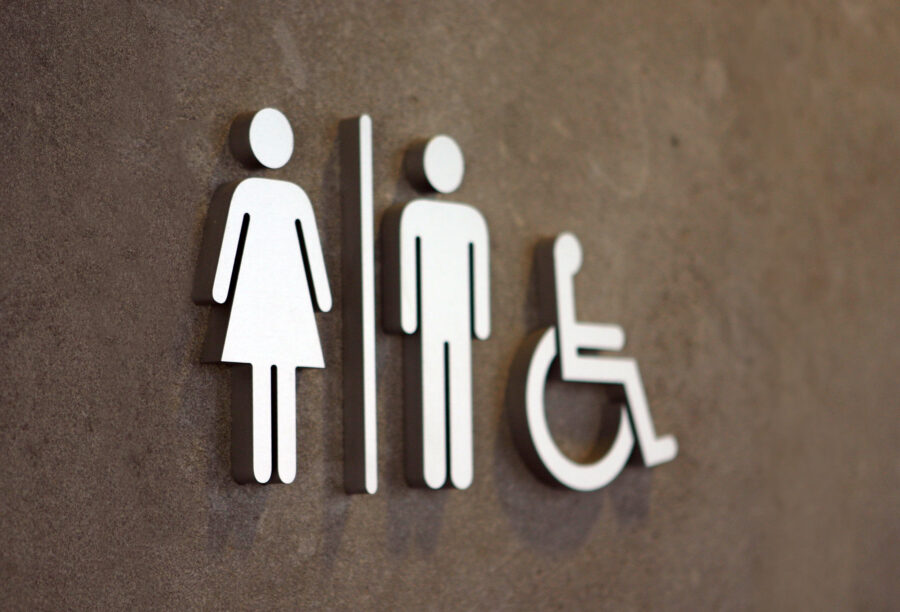

What does the Supreme Court decision in For Women Scotland mean for your business?
The recent Supreme Court (“SC”) case For Women Scotland v The Scottish Ministers has generated heated debate, high emotion and media coverage in the UK and beyond.
After years of argument about single-sex spaces between the polarised communities involved, the court has ruled that ‘sex’ in the Equality Act 2010 (the “Act”) refers to biological sex.
The definition of ‘woman’ therefore doesn’t include transgender women whether they have a gender recognition certificate (“GRC”), or not. Much of the debate has focused on the use of single sex spaces. We take look at what the ruling means for businesses faced with the practical effect of the judgment and how they can navigate staff access to workplace facilities.
Inevitably, many employers are seeking guidance on who is now allowed to use women’s toilets. Tensions show no sign of abating between those who believe that only biological women should be able to use them and those who continue to believe that transwomen should also be free to use the facilities of the gender they identify as.
What is the case about?
Looking at the SC’s decision on biological sex in more detail, the Act makes it unlawful to discriminate against a person because of a protected characteristic. The protected characteristic of sex makes it unlawful to discriminate against a person because they are a man or a woman. However, the Act isn’t clear whether “sex” means biological sex or legal (certified) sex.
The SC held that interpreting the meaning of ‘sex’ as a person’s certificated sex would obscure the definitions of ‘man’ and ‘woman’, leading to an inconsistent interpretation of the Act. This is particularly relevant to sections of the Act where the biological definition of sex is used. For example, protections for women which relate to pregnancy and maternity. Additionally, interpreting the meaning of ‘sex’ as a person’s certificated sex would mean that a biological woman living as a transgender man (with a GRC) would be excluded from those protections, despite their capacity to be pregnant.
The SC held that including certificated sex in the definition of ‘sex’ for the purposes of the Act would cause further difficulty regarding single sex spaces and provisions. Under the Act, the provision of separate sex services is not unlawful where provision of joint services would be less effective. Using the example of female-only spaces, if ‘sex’ means certificated sex, institutions would have to allow transgender women with a GRC to use those facilities. The SC held that this is not workable as it may be difficult (or impossible) for service providers to distinguish between transgender women with a GRC and those without. It would also be difficult to see how those separate provisions could be seen as more effective, where service providers allow entry to transgender women with a GRC even if they present as biological men. The SC held that if that were the case, it would be unreasonable to refuse male-presenting biological men.
The SC also emphasised that transgender individuals, whether holding a GRC or not, will still be protected from direct and indirect discrimination, and harassment, under the protected characteristic of ‘gender reassignment’.
Practical challenges for businesses from the Supreme Court’s decision in For Women Scotland v The Scottish Ministers
The effect of the SC ruling is that workplaces are now required to provide separate single-sex facilities. Transwomen should not be admitted to the provision for women, nor transmen admitted to the men’s. The alternative is to provide appropriate separated gender-neutral or private and fully self-contained mixed-sex facilities. For businesses aware that one of their employees is a transwoman and with limited physical space to make changes to their sanitary provision, the ruling is likely to bring significant challenge. Those businesses with gender neutral facilities in fully private, lockable individual rooms, with their own washbasins and sanitary bins, are likely to be the lucky minority. What happens if there is only one such fully lockable, self-contained toilet in a building on several floors?
This requires a careful balancing of the SC ruling, alongside the Workplace (Health, Safety and Welfare) Regulations 1992 (the “Regulations”), which require “suitable and sufficient sanitary conveniences…at readily accessible places” that “allow everyone at work to use them without unreasonable delay”. It goes on to require that “separate rooms containing conveniences are provided for men and women except where and so far as each convenience is in a separate room the door of which is capable of being secured from inside”. Further guidance on what amounts to “readily accessible” and “unreasonable delay” is set out in British Standard 6465 Sanitary Installations, which suggests that “staff in permanent stationary workplaces in buildings should not have to walk more than 100 metres or travel up or down more than one floor to use the sanitary facilities”. Guiding a transwoman to travel down 3 flights of stairs to use the only fully self-contained gender-neutral toilet may not therefore be a risk-free approach.
Some businesses are taking the view that the least risky option is to direct trans staff, who can’t or won’t use the provision for their biological sex, to use the disabled toilets, which are usually fully self-contained. This may not be universally welcomed by trans staff who feel that they are being singled out or ‘outed’ to their colleagues who may not be aware of their trans status. Disabled staff may also be unhappy about the impact on them of more people using of the provision designed to address their specific needs.
Businesses will need to carefully consider the risks of discrimination claims based on a range of competing protected characteristics before taking steps to become compliant with the SC ruling. The Equality and Human Rights Commission has published interim guidance on the provision of single-sex toilets, changing and washing facilities in workplaces and is currently engaged in a consultation which will run until 30 June 2025. Following that consultation, it proposes to issue authoritative guidance and amendments to its Code of Practice, which will no doubt be eagerly awaited by employers seeking to navigate this controversial issue.
Our employment team is at the ready for your questions on the ruling and happy to work with you to find pragmatic solutions.
Informed Insight
Read more on the ruling or explore other articles from Informed Insight.


Holding land in SIPPs or SSASs – is this still a smart investment?
Read more











